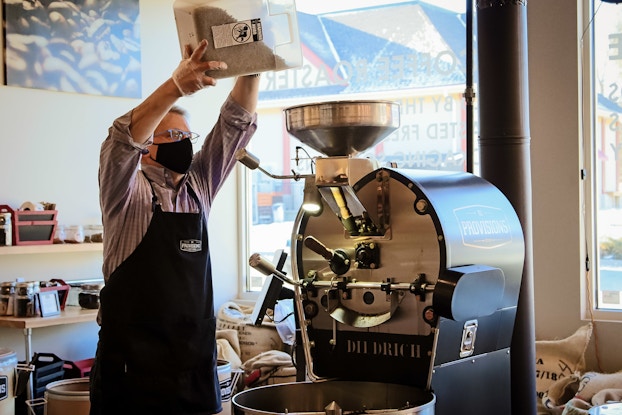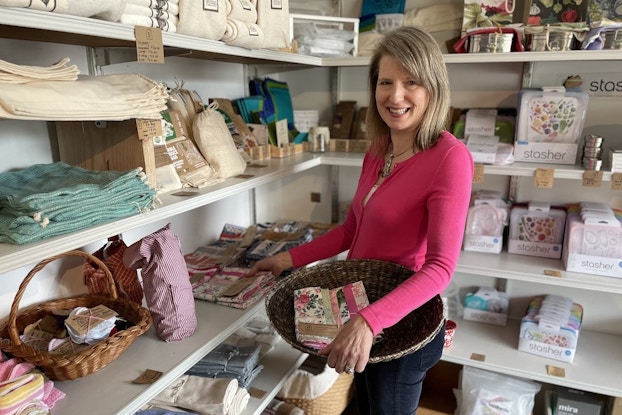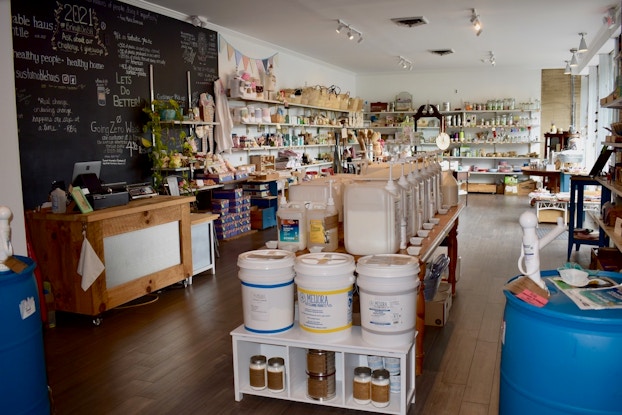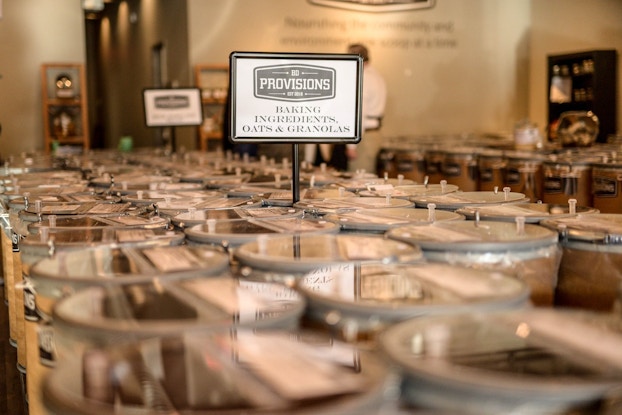
Why it matters:
- More than half of U.S. consumers say they are very concerned about what excess packaging is doing to the planet.
- This trend is expected to grow as Generation Z, which is the most vocal in demanding sustainable alternatives, becomes a dominant consumer demographic.
- The movement ties into the shop-local trend, with package-free and refillable stores becoming neighborhood hubs for sustainability.
The zero-waste movement, which seeks to maximize recycling, minimize waste and reduce consumption, is growing in America, and businesses—from Main Street merchants, to the country’s largest retailers, to digital startups—are responding.
A 2020 study by McKinsey & Company found that 55% of U.S. consumers described themselves as extremely concerned or very concerned about the environmental impact of product packaging.
While those consumers still rank factors like price, quality and brand ahead of sustainable packaging in making their buying decisions, McKinsey recommended that retailers and vendors respond to changing consumer sentiment by making sustainable packaging “not only available, but apparent to consumers.”
TikTok videos tagged with #zerowaste or #zerowastestore are drawing hundreds of thousands of views, and Target, Walmart, Amazon and other mass merchants have launched campaigns to promote the use of zero-waste and plastic-free products.

But the biggest impact of the movement could be in local business districts, where stores are springing up to offer consumers a neighborhood location where they can buy food items, household cleaning supplies, soap, shampoo and other beauty products, without creating packaging waste.
Hundreds of independent Main Street stores across the country, with examples in each of the 50 states, are selling bulk groceries and household supplies in refillable containers, according to Litterless, a zero-waste resource website. Many of those stores have opened within the past three to four years, and the owners say they expect demand will only get stronger.
“It’s something that’s coming to every town. But it’s coming not from big conglomerates, but from little people,” Janette Spezio, owner of Sustainable Haus Mercantile, a zero-waste store in Summit, New Jersey, told CO—. Spezio started out selling alternatives to single-use napkins and paper towels and refillable, package-free cleaning supplies at farmers’ markets, and opened her store last year.
[Read: How 3 Hot Startups Are Monetizing the Booming Food Waste Business]
I think we’re at the very beginning of a trend.John Boccuzzi, co-founder, BD Provisions
‘We were profitable from week one’
John Boccuzzi, his wife Cynthia and their partners Tony and Tara DiPippa opened their first BD Provisions store in Newtown, Connecticut. Boccuzzi and Tony DiPippa met as executives at fruit-gifting chain Edible Arrangements.
The store, which opened in 2018, supplies customers with returnable and refillable mason jars they can use to select spices, coffee beans and other groceries, health and beauty items and cleaning supplies, and “we were profitable from week one,” John Boccuzzi said. “We look at it as if bulk food and Williams-Sonoma had a baby, it would be BD Provisions.”
Since then, they have opened another company-owned store in Fairfield, Connecticut and a franchise store in New Milford, and plan to expand the concept throughout the East Coast via franchising.
“We feel like the timing was right,” Boccuzzi said. “If this was 15 years ago, this store never would have made it. Five years ago, maybe. Three years ago, yes.”
Global consumer products brand Unilever has used BD Provisions to test package-free products.
“I think we’re at the very beginning of a trend,” he said.
[Read: Indoor Farming Businesses Meet Growing Demand for Local Produce]

Intent on disposing of disposables
At Sustainable Haus Mercantile in New Jersey, Spezio makes many of the items she sells with locally sourced materials, which reduces their environmental impact.
The store also has become a hub for other local businesses aimed at reducing waste.
For one, it’s a drop-off site for Java’s Compost, a company that turns food scraps into compost for gardeners.
Spezio is also working with community groups and restaurants to try to bring DeliverZero, a company that supplies restaurants with reusable takeout food containers, to Summit, New Jersey, and other neighboring towns.
DeliverZero is one of the startups born in recent years to address the movement away from single-use packages and disposables. It has created an alternative to disposable food takeout containers that is being used by more than 150 restaurants in New York City.
It’s working on a way to scale the business beyond New York City, with a version that lets diners request DeliverZero containers on delivery platforms such as DoorDash.
“Our goal is to make ordering in reusable containers normal everywhere,” Lauren Sweeney, co-founder of DeliverZero, told CO—.
Another startup, Grove Collaborative, has created an e-commerce store selling more than 150 sustainable brands, with the promise that all of the orders it fills are plastic-neutral, and that it will be 100% plastic-free by 2025.
Stojo, a nine-year-old housewares brand that makes reusable and collapsible food and beverage containers, is sold at Target, Whole Foods and other retailers.
The company estimates that each of its reusable coffee cups or food containers saves one gallon of water and eliminates 16 pounds of solid waste and 23 pounds of greenhouse gas emissions.

‘It’s a slow go, but by talking to people, they come around’
Zero-waste entrepreneurs, from digital startup founders to the new zero-waste merchants of Main Street, are realistic about what it will take to change the consuming habits of American consumers.
“It’s a slow go,” said Spezio. “It’s a hard sell to get people to make these shifts, but I really believe by talking to people and explaining the benefits, they come around.”
Boccuzzi of BD Provisions agrees.
“We still have a ways to go. People don’t want to be too inconvenienced,” he said.
BD Provisions, for its part, uses food experiences like the smell of roasting coffee beans, samples of chocolate-covered almonds and other treats to entice shoppers to the refillable and zero-waste lifestyle.
“I think we’ve made it convenient enough that people can come in and say ‘Wow, I’m helping out a little bit with the planet, which is awesome, and I’m having an awesome experience and getting products I want,” Boccuzzi said.
He believes the zero-waste trend will only get bigger. “The Atkins diet, gluten free, all these different trends, everybody’s doing it and then a year later it’s gone. I don’t think that’s going to happen with saving the planet,” he said.
CO— aims to bring you inspiration from leading respected experts. However, before making any business decision, you should consult a professional who can advise you based on your individual situation.
Follow us on Instagram for more expert tips & business owners’ stories.
CO—is committed to helping you start, run and grow your small business. Learn more about the benefits of small business membership in the U.S. Chamber of Commerce, here.






